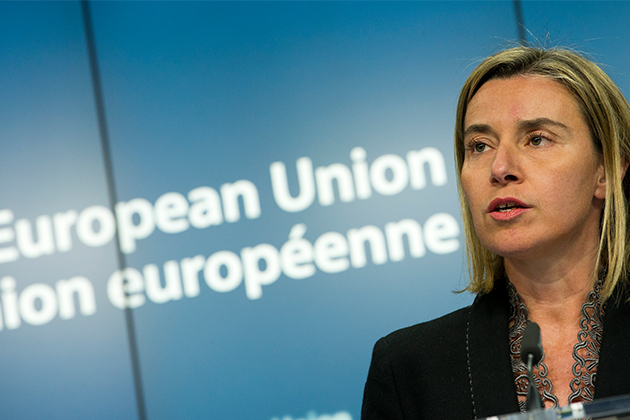19/05/2015

HR/VP Federica Mogherini at the Foreign Affairs (Defence) Council
On Monday 18 May the EU took the
decision to create a naval force to disrupt human smugglers in the
Mediterranean which will form part of a wider approach to saving lives
at sea. The joint meeting of Foreign and Defence Ministers also
discussed common security and defence policy and set out ways to make it
stronger and more effective in the face of security challenges to
Europe such as the crises in Syria and Ukraine.
Chairing the meeting, EU High
Representative Federica Mogherini said that the decision to create the
naval force was part of a comprehensive approach to solving the
migration crisis in the Mediterranean. She said the EU would work with
its Africa and Arab partners and help tackle the root causes – namely
poverty, crisis and war.During the Foreign Affairs Council Ministers also discussed the Middle East Peace Process, how to re-launch it and the role of the European Union in helping the peace talks. It comes ahead of Federica Mogherini's visit to Jerusalem and Ramallah later this week.
EUNAVFOR Med to tackle smuggling networks
The EU Naval Force – EUNAVFOR Med - will aim to break the business model of smugglers and traffickers. Based in Rome and headed by Italian Rear Admiral Enrico Credendino, it will work in the Southern Central Mediterranean and in partnership with Libyan authorities. Planning and assessment of smuggling networks will be the first stage, followed by the searching, seizing and disruption of assets of smugglers all within the framework of international law.Speaking to the press after the meeting, Federica Mogherini said she hopes the planning – both practical and political in the UN Security Council – will be completed by the June Foreign Affairs Council. This Common Security and Defence Policy (CSDP) operation is part of a set of comprehensive measures aimed at responding to the immediate need to save lives, address emergency situations but also to tackle the root causes of irregular migration as requested by the European Council on 23 April 2015.
Amid new security threats, more effective security & defence required
At the meeting, Foreign and Defence Ministers also adopted conclusions on strengthening the EU's common security and defence policy and also held discussions with NATO Secretary General Jens Stoltenberg. The talks came ahead of the June European Council where leaders of all 28 countries will discuss Security and Defence.In a joint statement Ministers from the 28 EU countries said "the global and European security environment has changed dramatically in recent years. This calls for a stronger Europe, with a stronger and more effective Common Security and Defence Policy (CSDP). The conflicts, threats and instability in the EU's immediate and wider neighbourhood, affecting inter alia Iraq, Libya, the Sahel, Syria and Ukraine, as outlined in the report from the High Representative, together with long standing and newly emerging security challenges, are significantly impacting European security as well as international peace and security, and challenging our fundamental values and principles."
Ministers went on to say that "the EU and its Member States, through the Common Security and Defence Policy (CSDP) and other policies and instruments, have a strong role to play through the unique EU Comprehensive Approach to preventing and managing conflicts and addressing their causes."
Burundi
The Council condemned the attempted coup d'état in Burundi and called on Burundian actors to solve their differences by peaceful means. It also urged restraint from actions that could further increase tension in the country.Links:


